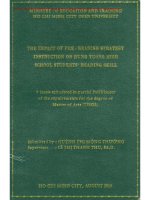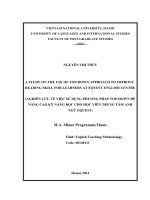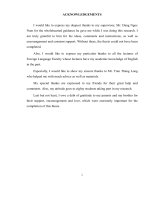Investigating the reading skill challenges of the first-year non-major students of English
Bạn đang xem bản rút gọn của tài liệu. Xem và tải ngay bản đầy đủ của tài liệu tại đây (235.8 KB, 4 trang )
1
COLLEGE OF FOREIGN LANGUAGES - VNU, HANOI
POSTGRADUATE STUDIES DEPARTMENT
DƯƠNG THỊ HUYỀN
INVESTIGATING THE READING SKILL CHALLENGES
OF THE FIRST- YEAR NON- MAJOR
STUDENTS OF ENGLISH
(TÌM HIỂU VỀ NHỮNG THÁCH THỨC ĐỐI VỚI
KỸ NĂNG ĐỌC HIỂU CỦA SINH VIÊN NĂM THỨ NHẤT
KHÔNG CHUYÊN ANH)
M.A. Minor Programme Thesis
Major: English Methodology
Code: 60 14 10
Hanoi – 2011
2
COLLEGE OF FOREIGN LANGUAGES - VNU, HANOI
POSTGRADUATE STUDIES DEPARTMENT
DƯƠNG THỊ HUYỀN
INVESTIGATING THE READING SKILL CHALLENGES
OF THE FIRST- YEAR NON- MAJOR
STUDENTS OF ENGLISH
(TÌM HIỂU VỀ NHỮNG THÁCH THỨC ĐỐI VỚI
KỸ NĂNG ĐỌC HIỂU CỦA SINH VIÊN NĂM THỨ NHẤT
KHÔNG CHUYÊN ANH)
M.A. Minor Programme Thesis
Major : English Methodology
Code : 60 14 10
Supervisor: Dr. Ha Cam Tam
Hanoi – 2011
6
TABLE OF CONTENT
page
PART ONE: INTRODUCTION
1
1. Rationale for the study
1
2. Aims of the study
2
3. Significance of the study
2
4. Scope of the study
2
5. Method of the study
3
6. Organization of the study
3
PART TWO: DEVELOPMENT
4
CHAPTER ONE: LITERATURE REVIEW
4
1.1. Reading and Reading Comprehension
4
1.2. Reading process
5
1.3. Context and the role of Context
7
1.4. Schema Theory
9
1.5. Reading Comprehension Levels
10
1.6. Reading Comprehension Skills
14
1.6.1. Reading for specific information
17
1.6.2. Finding the main ideas
17
1.6.3. Guessing vocabulary from the context
19
1.6.4. Making inferences
20
CHAPTER TWO: THE STUDY
22
2.1. Research Question
22
2.2. Participants
22
2.3. Data Collection Instruments
22
2.4. Data Collection Procedure
24
2.5. Analytical Framework
24
2.6. Data Analysis and Discussion
27
2.6.1. Making inferences
28
2.6.2. Finding the main ideas
30
2.6.3. Guessing vocabulary from context
32
7
2.6.4. Reading for specific information
PART THREE: CONCLUSION
34
36
3.1. Major findings
36
3.2. Implications
37
3.3. Limitations for the study
37
3.4. Suggestions for further study
38
References
Appendices
Appendix 1: Sample of test 1
Appendix 2: Keys of test 1
Appendix 3: Sample of test 2
Appendix 4: Keys of test 2
Appendix 5: Results of making inferences
Appendix 6: Results of finding the main ideas
Appendix 7: Results of guessing vocabulary from context
Appendix 8: Results of reading for specific information
39









